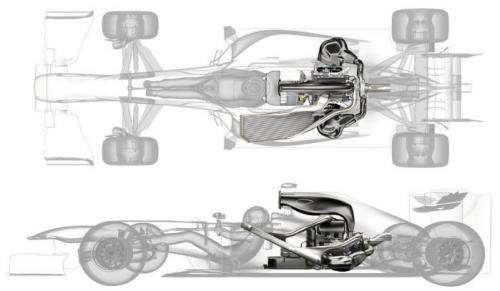January 25, 2014 weblog
Formula 1 racing focus turns to energy management

(Phys.org) —Videos and preview briefs are surfacing on news sites about what we can expect in this year's Formula 1 World Championship. The consistent message is technical change, the use of hybrid technology and a focus on efficiency. Call it hybrid tech, or any fitting term to describe the balance that will be seen in 2014 between output and efficiency in the machines. Eyes are on the engines. As the BBC stated, the sport goes further than ever before to embrace green technology and the major turn rests in the 1.6-liter V6 turbo engines, which is a departure from the 2.4-liter V8 engines.
Rob White, Deputy Managing Director (technical), Renault, said that the word "engine" just won't fully describe a 2014 car's propulsive power. "It is more relevant to refer to the complete system as a 'Power Unit.'''
F1 cars will be powered by the turbocharged 1.6-litre V6 internal combustion engine. They replace the 2.4-litre V8s, in use since 2006. "V6" involves an internal combustion engine with an arrangement of two banks of three cylinders in a V configuration over a crankshaft.
.
Then there are the limits: Engines must consume fuel at no more than 100kg per hour. That's down from about 150kg teams used last year.
The F1 talk of technical shake-ups also rests in ERS, which stands for energy recovery system. These cutting-edge systems represent a change from the previous KERS, or Kinetic Energy Recovery Systems. The latter was introduced to the sport in 2009; it worked by harnessing waste energy created under braking and transforming it into electrical energy. ERS, said the BBC, is made up of the KERS system and a second electric motor fitted to the turbo. "As for the second electric motor, that will harness energy from the turbo that would otherwise be wasted as heat."
Quoted in a Wired report on F1 highlights for 2014, Naoki Tokunaga, Renault F1′s technical director for Power Units, said, "In essence, engine manufacturers used to compete on reaching record levels of power, This year is another matter. Now they are to compete, he said, "in the intelligence of energy management."
What does this 2014 focus mean for the Formula 1 drivers? They are also bracing themselves for the new type of car behavior. This year, said AUTOSPORT, demands on fuel economy mean that the drivers will need to adjust. "This different way of driving will need practice - to learn how best to be fast but not to use up too much fuel." said James Allison, Ferrari technical director.
According to the BBC, "Formula 1 is introducing arguably the biggest set of rule changes in its history this season." Renault would not disagree. According to Renault, "In 2014 Formula 1 will enter a new era. After three years of planning and development, the most significant technical change to hit the sport in more than two decades is introduced. Engine regulations form the major part of the coming revolution, with the introduction of a new generation of Power Units that combine a 1.6 liter V6 turbocharged engine with energy recovery systems that will dramatically increase efficiency by harvesting energy dissipated as heat in the exhaust or brakes."
© 2014 Phys.org















